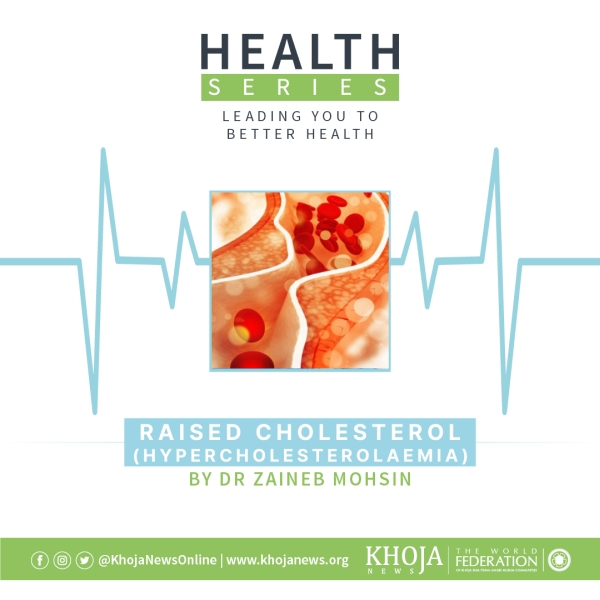
What is a raised cholesterol?
Cholesterol is a fatty substance that is an essential part of the walls of all our cells. It is also necessary for producing many hormones and enzymes in our body. Most of the cholesterol in our blood comes from the liver. However, part of our cholesterol requirements come from the diet. A high level of cholesterol in our blood is called hypercholesterolaemia.
This is harmful as it can increase your risk of heart and circulatory diseases such as heart attack, stroke and vascular dementia.

What are the types of cholesterol?
There are two main types of cholesterol, one good and the other bad. Having too much ‘bad’ cholesterol can cause problems with your health. Cholesterol is carried in your blood by proteins. When cholesterol and proteins combine, they are called lipoproteins.
High-density lipoproteins or HDL is called ‘good’ cholesterol. This is because it gets rid of the ‘bad’ cholesterol from your blood. It takes cholesterol that you don’t need back to the liver. The liver breaks it down so it can be passed out of your body.
Non-high-density lipoproteins or non-HDL is called ‘bad’ cholesterol. This is because when there is too much of it, it can build up inside the walls of the blood vessels. This causes narrowing of the arteries which increases your risk of having a heart attack or stroke.
You may have also heard ‘bad’ cholesterol being called ‘LDL’ cholesterol. This was previously used as the main measure of bad cholesterol, but we now know that other forms of non-HDL cholesterol are also harmful.
Triglycerides
Our blood also contains a type of fat called triglycerides. This is stored in the body’s fat cells. Being very overweight and eating a lot of fatty and sugary foods o can make you more likely to have a high triglyceride level. Triglycerides can also contribute to the narrowing of the artery walls, increasing your risk. You may see it on your cholesterol reading results, and your doctor will be able to tell you if it is too high.
You can have a normal level of HDL and non-HDL cholesterol but still have a high triglyceride level.

What are the causes for a raised cholesterol?
There are modifiable and non-modifiable causes for a raised cholesterol.
These causes include:
- Being male
- Eating a diet high in processed foods including excess refined sugar.
- Being overweight, especially carrying extra body weight around the middle.
- Having diabetes or underactive thyroid
- Genetic causes such as a condition called ‘familial hypercholesterolemia’
- Sedentary lifestyle
- Advanced age
- Liver or kidney disease
What are the symptoms of a raised cholesterol level?
Anyone can have high cholesterol, even if they are slim, eat well and are physically active. A raised cholesterol level does not have any symptoms until it has caused a complete block in one of the arteries in the heart or brain which leads to a heart attack or stroke. Therefore, it is very important to have regular blood tests with the GP at least once annually to check your cholesterol level.
How is a raised cholesterol level diagnosed?
This is diagnosed by means of a simple blood test. Usually, different types of cholesterol are measured in the same blood test together with the triglyceride (a type of fatty molecule) in the blood to get a complete picture of the total cholesterol (TC), good cholesterol (HDL), bad cholesterol (LDL) and triglycerides.

As a rule, the higher the LDL cholesterol level, the greater the risk to health. A blood test only measuring total cholesterol may be misleading. A high total cholesterol may be caused by a high HDL cholesterol level and is therefore healthy. It is very important to know the separate LDL cholesterol and HDL cholesterol levels.
Your level of LDL cholesterol has to be viewed as part of your overall cardiovascular health risk. The cardiovascular health risk from any given level of LDL cholesterol can vary, depending on the level of your HDL cholesterol and on any other health risk factors that you may have. Therefore, a cardiovascular risk assessment considers all your risk factors together.

How is raised cholesterol treated?
A raised cholesterol level is treated by lifestyle and medication if needed. Lifestyle measures can be extremely effective at lowering the serum cholesterol.
- This includes dietary measures such as
a. A Mediterranean-style diet which is based on vegetables, fruits, beans, fish, nuts and unsaturated fat such as olive oil, together with avoiding processed food and added sugar, has been shown to be helpful for cholesterol levels. Eating two ounces of nuts a day such as walnuts and almonds can reduce LDL cholesterol by 5%.b. Eating high fibre diet will lower cholesterol by reducing the amount absorbed from your intestine. This can be achieved by having at least 5 portions of fruit and vegetables a day and eating high fibre foods such as pulses (lentils, beans and chickpeas), oats and seeds.c. Eating fish two or three times a week can lower LDL in two ways: by replacing meat, which has LDL-boosting saturated fats and by delivering LDL-lowering omega-3 fats. mega-3s reduce triglycerides in the blood stream and also protect the heart.
Healthy oils in the Mediterranean Diet: olive oil, avocadoes & nuts - Regular physical activity at least 150 minutes per week, brisk walking is ideal
- Losing excess weight if overweight. Losing just 5-10% of your body weight if you are overweight can make a significant difference to your cholesterol levels.
- Smoking cessation can improve your cholesterol numbers.
- Decrease the amount of stress in your life is important.
- Avoiding trans-fats in the diet They can also be high in processed foods such as cakes, biscuits and preprepared meals. Trans fats may be found in some processed foods.
- Avoiding saturated fats in the diet especially from animal sources such as meat and dairy.
- Controlling other risk factors for heart disease and stroke such as diabetes and high blood pressure. Make your GP aware of any family history of early heart disease.
If the cholesterol cannot be controlled by dietary measures alone, your doctor will suggest that you be started on a medication, which is usually a statin. If you are started on medication, it is important to continue lifestyle measures as it works together with treatment to give you the best possible outcome in terms of preventing future cardiovascular disease.
Where can I go to find more information about hypercholesterolemia?
Authored by:
Dr Zaineb Mohsin
MBBch, MSc in Critical care (UK), MRCP(UK)
Qualified as a physician, trained in Endocrinology and Diabetes from Imperial NHS Trust and currently working as a research fellow in Metabolic bone disease at Oxford University













